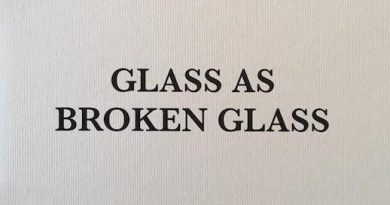‘Human Shade’ by Robert Peake
-Reviewed by Martha Sprackland–
if what is true brings us sorrow,
if what sorrow brings is truth…
(‘Desdemona’s Apology’)
Human Shade is, unusually, a pamphlet published in a single volume sandwiched between pamphlets from two other poets, and it is in reading the whole that Peake particularly stands out. This is the sort of poetry that should be finding a home in pamphlet form – rough-edged, tender, sad. The collection orbits the black hole created by the loss of a child, to whom five poems in memoriam are plaintive rather than passé. The more poetic evocations of grief, ‘goodbye / was already on your lips, a silent prayer’ earthed by the poem’s plumb weight line, ‘to be brutally honest, I loved you’ (‘Father-Son Conversation’). Somewhat reminiscent of Paterson’s ‘The Swing’ (in Rain), the poetry in Human Shade is imbued with the child, saturated with its absence. ‘Of course, my son, who lived / too briefly for my liking, / was there with me as well’, Peake acknowledges in ‘Koi Pond’, that clever linebreak resolutely setting the tone.
Throughout, Peake manages the subject of his son’s death both dextrously and eloquently. The line ‘I lash my faith to the mast of a boat’ (‘Elegy for the News’) is entirely appropriate for a collection in which the tidelines of grief are oceanic, dynamic, ever-changing, lapping up against the edges of the poems yet crucially avoiding the spill into sentimentality. Indicative of the poet’s skill is the way Peake is able to address his grief; in a poem about his son he is controlled, silent, ‘I disown the alphabet / unsaying each letter’ (‘To Friends Not Knowing What To Say’), whilst a poem about a road sign at the Mexican border is allowed to contain the line about the child ‘who rises as though winged in a blaze of light’ (‘Road Sign on Interstate 5’). The poems are shared, spliced, images from certain pieces belonging to others, yet all coalescing on the child, and all the better for their displacement.
There are, admittedly, some weaker poems; ‘Radish’ and ‘Recipe for the Broken’ feel a little like padding against the stronger poems on either side. There are, inevitably, clumsy lines which jar, too-soon pushed into the poem before they’ve gone through the editorial mill: ‘Now grief sparks again in my dome-covered brain’.
The lasting impression of the collection is, however, of strong work gathered intelligently and often beautifully around a poignant and well-executed set of core material. Images of water and ice, stasis and kinesis, arrested movement and flow pull a thread through the poems, drawing them together without gimmick to leave a lingering sense of submerged sadness, crystalline hope and the muted half-light of grief.
Bringing us back and forth with the rock and ebb of the poems and the distant light of recovery, Peake is first ‘frozen on my couch / I blinked into the sunlight, and you were gone’ (‘To the Bear in a Neighbor’s Tree’) before musing ‘Who knew the river of death would be beautiful?’ (‘Acheron’). In ‘The Ice Has Come Back’ he writes ‘I sleep / in ice’, again anaesthetised, motionless, managing, before the tide rushes in again and ‘it comes down on me – everything I pushed out of my mind’ (‘Human Shade’). In the final poem, ‘Meteorology’, the waters calm and the light pushes in through ‘a break in the clouds, / which were never evil’. The collection ends on the promise of hope without the trite self-help conclusion too often found in collections assembled around a death. Although ‘it is over’, there is no divine light, the sun is streaming in ‘not as a symbol, / but the simple refraction / of light’. There’s no beating of the breast or falling to knees, just fragility, possibility. The triumph of this collection is configured in the last poem’s cautious approach to hope; no miracle, just the tentative possibility of respite, ‘the gentle / indifference of rain.’




Pingback: Highgate Poets :: Robert Peake Reviewed in Sabotage Reviews
Strong words for a powerful, wrenching but ultimately transcendent collection.
Robert Peake is amazing!
Pingback: Published Poetry 2012: a Top 10 « Sabotage